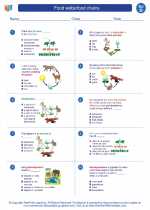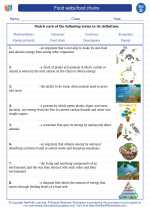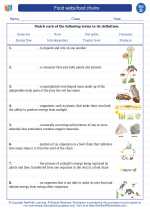Food webs/food chains -> melting
Melting
Melting is the process by which a solid substance changes to a liquid state when heat is applied. This change in state occurs when the temperature of the solid reaches its melting point, also known as the point at which the substance transitions from a solid to a liquid. During melting, the particles in the solid substance gain enough energy to overcome the forces that hold them in a fixed position, allowing them to move more freely and take on the properties of a liquid.
Factors Affecting Melting
Several factors can affect the melting process, including:
- Temperature: Increasing the temperature of a solid substance can lead to melting as it provides the particles with the necessary energy to break free from their fixed positions.
- Pressure: In some cases, changes in pressure can affect the melting point of a substance. For example, increasing the pressure can raise the melting point of ice, while decreasing the pressure can lower the melting point.
- Particle Arrangement: The arrangement of particles in a solid substance can also impact its melting point. Substances with tightly packed particles tend to have higher melting points, while those with looser arrangements have lower melting points.
Examples of Melting
Common examples of melting include:
- Ice Melting: When solid ice is heated, it reaches its melting point and transitions into liquid water.
- Candle Wax Melting: Applying heat to a solid candle wax causes it to melt and become a liquid, which can then be used for burning.
- Chocolate Melting: Solid chocolate can be melted by heating it, allowing it to transform into a liquid state for various culinary purposes.
Study Guide
To study the concept of melting, consider the following key points:
- Define the term "melting" and explain the process by which it occurs.
- Identify factors that can affect the melting point of a substance, such as temperature, pressure, and particle arrangement.
- Discuss real-life examples of melting and how it is relevant in everyday scenarios.
- Conduct experiments to observe and document the melting process of different substances under varying conditions.
- Explore the relationship between melting and other phase transitions, such as freezing and boiling.
By understanding the concept of melting and its underlying principles, you can gain valuable insights into the behavior of matter and its transformations under specific conditions.
[Melting] Related Worksheets and Study Guides:
.◂Science Worksheets and Study Guides Fourth Grade. Food webs/food chains

 Activity Lesson
Activity Lesson
 Worksheet/Answer key
Worksheet/Answer key
 Worksheet/Answer key
Worksheet/Answer key
 Worksheet/Answer key
Worksheet/Answer key
 Worksheet/Answer key
Worksheet/Answer key
 Vocabulary/Answer key
Vocabulary/Answer key
 Vocabulary/Answer key
Vocabulary/Answer key
 Vocabulary/Answer key
Vocabulary/Answer key
